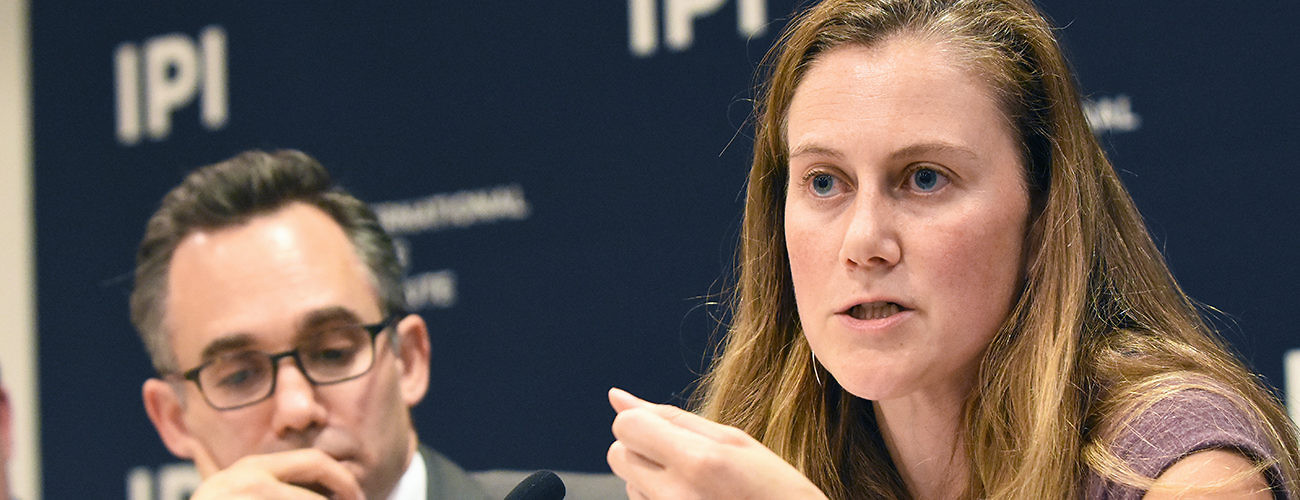Panelists at an IPI policy forum on “Preventing Mass Atrocities in an Era of Global Transition” agreed on the need to define a prevention agenda, which would reorient the work of the United Nations away from crisis response. However, they said, to implement such an agenda, the case for prevention will need to be made in terms that carry weight where the decision-making power lies—national capitals.
Naomi Kikoler, Deputy Director of the Simon-Skjodt Center for the Prevention of Genocide at the US Holocaust Memorial Museum, said prevention is actually the only way to remain cost-effective and efficient. “There is a real need to do a better job of making the case for prevention, trying to explain not just how prevention saves lives, but does a whole host of other things,” she said. “This sounds very callous, but naturally it comes down to the dollars and cents, and that at times, unfortunately, has more sway than discussing the moral obligation to save lives.”
The UN unanimously adopted a new principle, the Responsibility to Protect (R2P) as part of its 2005 World Summit, in an attempt to halt genocides like those of the 1990s. However, mass atrocity crimes—defined as widespread and systematic violence against civilians—have continued to occur in the past two decades, despite lessons learned, a strengthened norm of atrocity prevention, clearer policy frameworks, and more sophisticated policy options.
Ms. Kikoler, a human rights lawyer who speaks with ardor about genocide, the crime she specializes in, said that until recently, “I never actually thought I would be confronted with a situation where I would have to go and document genocide.” Speaking from her experience collecting evidence about the crimes of the Islamic State (ISIS) against Yazidi women, she said, “It is hard to comprehend that this crime has been allowed to happen, that we’ve been aware of it, and that it continues to persist.”
Answering a question about whether the International Criminal Court (ICC) should hear cases about ISIS crimes, she said, that in this case, “Justice has to be local…if it’s going to do anything in terms of preventing recurrence of atrocities.” Survivors in Iraq and Syria told her that they wanted “justice at the local level,” to deal with the personal pain of “their neighbors turning on them—being able to identify by name the person who stole their mother or killed their brother.” She noted that such lower-echelon perpetrators “are never going to be prosecuted by the ICC.”
The ICC is not the only part of the UN system in need of reform to better respond to genocide, and preventing atrocities and responding to mass atrocity crimes must be at the forefront of the UN agenda, requiring leadership from the secretary-general as well as the Security Council, she said. “To do that, they’re going to have to move forward the initiative that has been taken forward by the current secretary-general around Human Rights Upfront and try to change the cultural orientation of the entire UN system,” she said.
Ms. Kikoler continued her emphasis on local community empowerment while looking at the limitations of the Security Council in responding to such crimes. “If our focus around atrocity prevention is on the Security Council, we have a doomed endeavor,” she said. “The priority of the next few years has to be on defining what a prevention agenda looks like, and bringing the conversation to the capitals, having it informed by the local realities of populations on the ground, and using research to better save lives.”
Scott Straus, Professor of Political Science and International Studies at the University of Wisconsin, Madison, said that there is a better appreciation of the nuance involved in crafting a policy proposal that has the potential to prevent genocide. In the 1990s, cases like Rwanda and Bosnia were problematically presented to the international community in terms of a “binary choice,” he said. “You intervene militarily or you don’t, you send in peacekeepers against the wishes of a state or you don’t.” Today, while political will remains an essential factor, there is also a recognition that more elements must be considered, such as how hard it is to deter perpetrators.
His new book, Fundamentals of Genocide and Mass Atrocity Prevention, “aims to foster a strategic approach to the prevention of genocide,” Dr. Straus said. It was necessary to look for a case-sensitive approach to preventing mass atrocities. “Every situation is going to be different,” he said. “Given the situation, what is the realm of possibility? What is possible in terms of the mitigation or prevention of mass atrocities?” Answering these questions, he called for “humility about what is possible.” The geopolitics in Syria, for instance, make it “very difficult to have traction on an issue” he said.
The optimism about R2P in the new millennium faded with each test of the new norm, including Libya, Syria, and South Sudan. In 2011, the Libyan intervention brought to the fore the increasing divisions on the Security Council, as some felt the application of R2P was used for political, not purely humanitarian purposes. At a recent conference in Reykjavik, Iceland, IPI Vice President, Adam Lupel recalled a Russian official declaring the doctrine “dead after Libya.”
Dr. Straus said he hopes this is not the case. “Syria and Libya should not define the policy space on these questions,” he said, pointing to those instances where atrocity prevention has had relative success: Burundi, Colombia, Cote d’Ivoire, Guinea, Kenya, Kyrgyzstan, Mali, and Myanmar.
“In an era of global transition and globalization, there is greater need to pursue and enhance partnerships,” Adam Lupel, the event’s moderator, said. “That goes for both large institutions like the United Nations and US government, and for small independent bodies like IPI: none of us can go it alone.”
The October 14, 2016 event was co-hosted by the United States Holocaust Memorial Museum.








